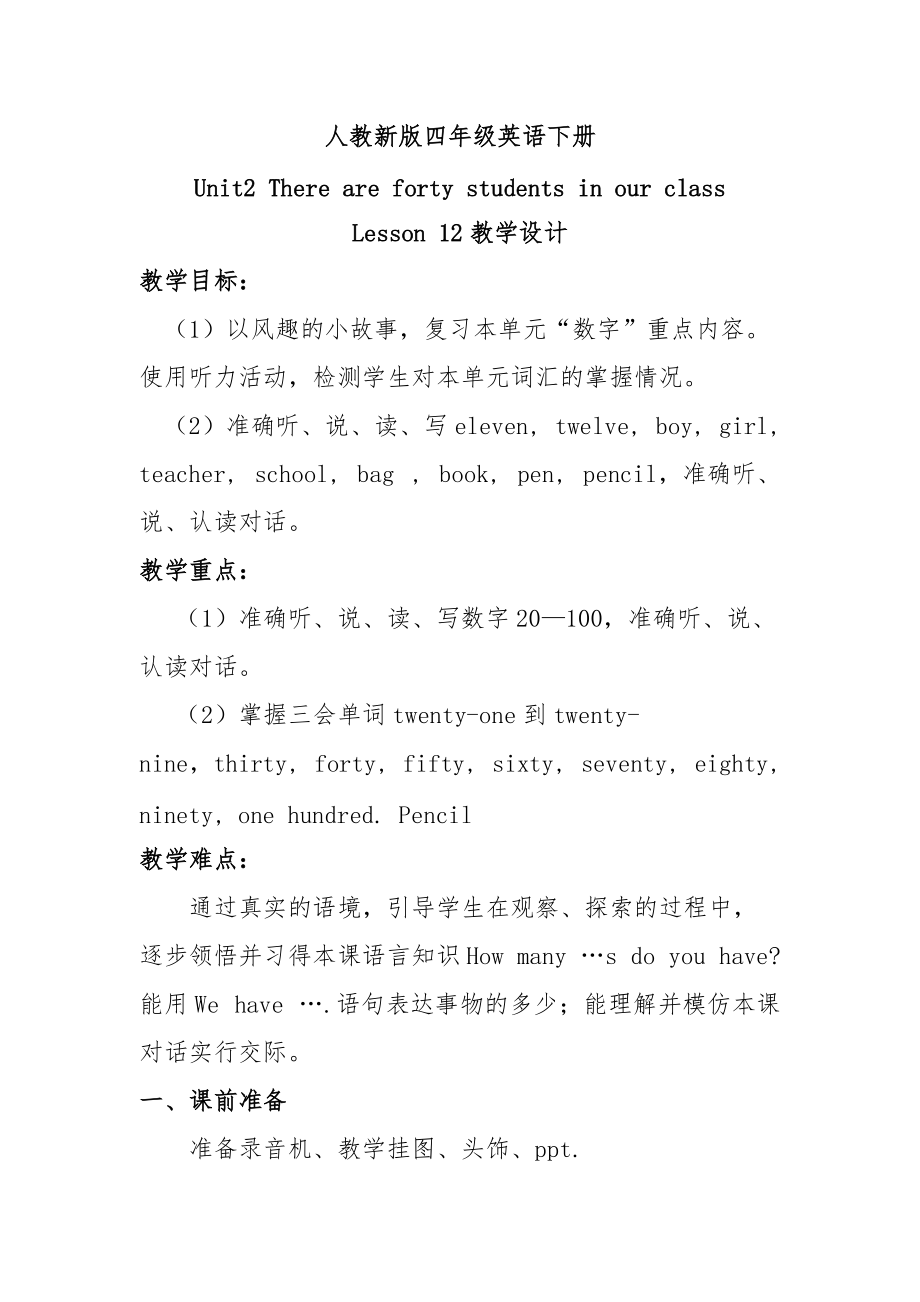《人教新版四年級(jí)英語下冊(cè) Unit2 There are forty students in our class Lesson 12教學(xué)設(shè)計(jì)》由會(huì)員分享,可在線閱讀�����,更多相關(guān)《人教新版四年級(jí)英語下冊(cè) Unit2 There are forty students in our class Lesson 12教學(xué)設(shè)計(jì)(3頁珍藏版)》請(qǐng)?jiān)谘b配圖網(wǎng)上搜索�����。
1����、
人教新版四年級(jí)英語下冊(cè)
Unit2 There are forty students in our class
Lesson 12教學(xué)設(shè)計(jì)
教學(xué)目標(biāo):
(1)以風(fēng)趣的小故事,復(fù)習(xí)本單元“數(shù)字”重點(diǎn)內(nèi)容���。使用聽力活動(dòng)����,檢測學(xué)生對(duì)本單元詞匯的掌握情況���。
(2)準(zhǔn)確聽���、說、讀��、寫eleven, twelve, boy, girl, teacher, school, bag , book, pen, pencil��,準(zhǔn)確聽�����、說���、認(rèn)讀對(duì)話��。
教學(xué)重點(diǎn):
(1)準(zhǔn)確聽����、說、讀�、寫數(shù)字20—100,準(zhǔn)確聽���、說����、認(rèn)讀對(duì)話���。
(2)掌握三會(huì)單詞twenty-one到twenty-nine
2����、����,thirty, forty, fifty, sixty, seventy, eighty, ninety, one hundred. Pencil
教學(xué)難點(diǎn):
通過真實(shí)的語境,引導(dǎo)學(xué)生在觀察�����、探索的過程中,逐步領(lǐng)悟并習(xí)得本課語言知識(shí)How many …s do you have? 能用We have ….語句表達(dá)事物的多少����;能理解并模仿本課對(duì)話實(shí)行交際����。
一、課前準(zhǔn)備
準(zhǔn)備錄音機(jī)�����、教學(xué)掛圖���、頭飾���、ppt.
二、教學(xué)過程
1���、熱身/復(fù)習(xí)(Warm-up/Revision)
Sing the number song. Review the numbers from 1to 100
3���、 and the sentences: How many pens/pencil/bags do you have? We have….
2、新課導(dǎo)入(Presentation)
(1)Today, the money, rabbit and elephant sit together. They help children in need. Let’s read the story. Who comes? 拿出事先準(zhǔn)備好的頭飾�,很自然地把本課的故事內(nèi)容帶到課堂上��,通引起學(xué)生的注意力和興趣����。����。
(2)教師播放錄音,學(xué)生聽錄音��,仿說�����。
(3)小組內(nèi)同學(xué)表演對(duì)話���。
3�����、趣味操練(Pra
4�����、ctice)
(1)練習(xí)聽力���,檢測學(xué)生掌握單詞的情況�。
(2)總結(jié)本單元的單詞和句型:
部落一:獨(dú)立的數(shù)字(1-12)
one 1 two 2 three 3 four 4 five 5 six 6 seven 7 eight 8 nine 9 ten 10 eleven 11 twelve12
部落二:以-teen結(jié)尾的數(shù)字(13-19)
thirteen ��,fourteen���,fifteen,sixteen ���,
seventeen �,eighteen�����,nineteen
口訣記憶
數(shù)字單詞很容易�,1至12特殊記,13數(shù)到19 去�,后加-teen莫
5、忘記����,
20以上整十?dāng)?shù),結(jié)尾都把-ty來加,
詢問及回答數(shù)量的句型以及相應(yīng)的回答:
How many… are there in your …? There are….
How many … do you have ? I have ….
讓學(xué)生先讀�,再聽寫。檢測學(xué)生對(duì)本單元知識(shí)的掌握情況���。
4�、板書設(shè)計(jì):
Lesson 12
How many… are there in your …? There are….
How many … do you have ? I have ….
5��、作業(yè)設(shè)計(jì):
(1) Listen and read the dialogue.
(2) Recite the language focus.
 人教新版四年級(jí)英語下冊(cè) Unit2 There are forty students in our class Lesson 12教學(xué)設(shè)計(jì)
人教新版四年級(jí)英語下冊(cè) Unit2 There are forty students in our class Lesson 12教學(xué)設(shè)計(jì)

